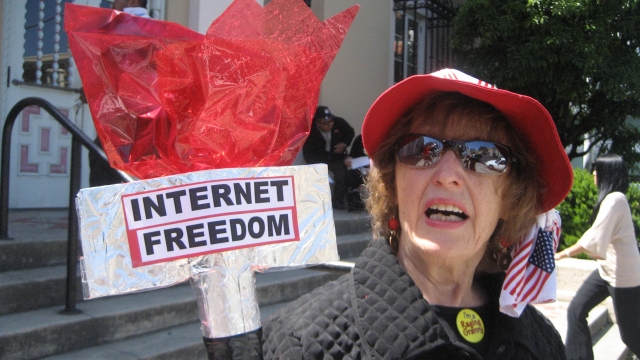Editor’s Note: This guest post is written by Richard Fontaine, a Senior Advisor at the Center for a New American Security and the co-author (with Will Rogers) of Internet Freedom: A Foreign Policy Imperative in the Digital Age, from which this post is partly drawn.
What is Internet freedom? The United States government has an “Internet freedom” agenda, complete with speeches by the Secretary of State and millions of dollars in program funding. A key United Nations official last year issued a major report emphasizing the right of all individuals freely to use the Internet. Taking a different tack, Vint Cerf, one of the Internet’s founding fathers and “Chief Internet Evangelist” at Google, recently argued in the New York Times that Internet access is not a human right. And Devin Coldewey parsed the debate in TechCrunch, noting that the Internet is an enabler of rights, not a right unto itself.
The answer matters. As an ever greater proportion of human activity is mediated through Internet-based technologies, the extent of our online rights — and what we really mean by “Internet freedom” — will take on greater importance in political and economic life. After a year in which new communications tools were used to dramatic effect throughout the Middle East, and at a time when autocratic governments are cracking down against online freedom, it is worth pausing to get straight the concept so many hold dear.
We might start by distinguishing between two linked but distinct concepts: freedom of the Internet and freedom via the Internet. Freedom of the Internet refers to the ability to engage in unfettered expression in cyberspace. This vision of Internet freedom, as scholar Evgeny Morozov has pointed out, represents freedom from something: censorship, government surveillance, DDoS attacks, and so on. The principles undergirding freedom of the Internet are articulated in documents such as the Universal Declaration of Human Rights, which describes as inalienable the right to receive and impart information without interference, “throughout any media and regardless of frontiers.”
In this sense, Internet freedom is little different from the notion of free expression, whose advocacy has been an element of U.S. foreign policy for decades. After all, American ambassadors have long pressed foreign governments to allow a free press, release jailed journalists and cease jamming unwanted broadcasts.
Freedom via the Internet is at once both a more alluring and complicated idea. Its advocates suggest that more online freedom can lead to more offline freedom; that is, the free flow of ideas over the Internet promotes democratization. Anyone who witnessed the Arab Spring cannot fail to be moved by the use of new communications tools by protestors to foment political change – nor by the desperate attempts by Mubarak’s Egypt, Qaddafi’s Libya, and others to stop them from doing so.
Then there is Internet access itself. While taking away the ability of individuals to engage in legitimate online expression seems clearly to represent a human rights violation, it is difficult to view governments that fail to provide broadband for their populations as human rights violators.
It is important that those who care about Internet freedom achieve a measure of conceptual clarity, because those who would abridge it are using definitions for their own ends. At an April 2008 U.N. conference that sought to clarify what represents “aggression” online, for instance, a senior Russian official argued that “any time a government promotes ideas on the Internet with the goal of subverting another country’s government – even in the name of democratic reform – it should qualify as ‘aggression.’” Similarly, the six-member Shanghai Cooperation Organisation – which includes Russia and China – in 2009 adopted an accord that reportedly defined “information war,” in part, as an effort by a state to undermine another’s “political, economic and social systems.”
Government officials and their private sector counterparts have a key role to play in all of this. The United States should be in the lead in formulating acceptable international definitions of Internet freedom, aggression, and cyber security that respect widely-recognized human rights. It will also need to continually articulate the distinction between political speech permissible under such regimes as the Universal Declaration of Human Rights and truly illicit online activity (like child pornography, cyber crime, and terrorism).
None of this will be easy. Even some of America’s closest democratic friends have views of Internet freedom that are more restrictive than those widely held in the United States. Witness recent attempts by the government of India to have key Internet companies remove objectionable content or restrictions in Europe on online speech that insults population groups. But the effort begins with getting straight precisely what we mean by “Internet freedom.” The idea – and the reality – is too important to muddle.
Excerpt Image from Feross.org
